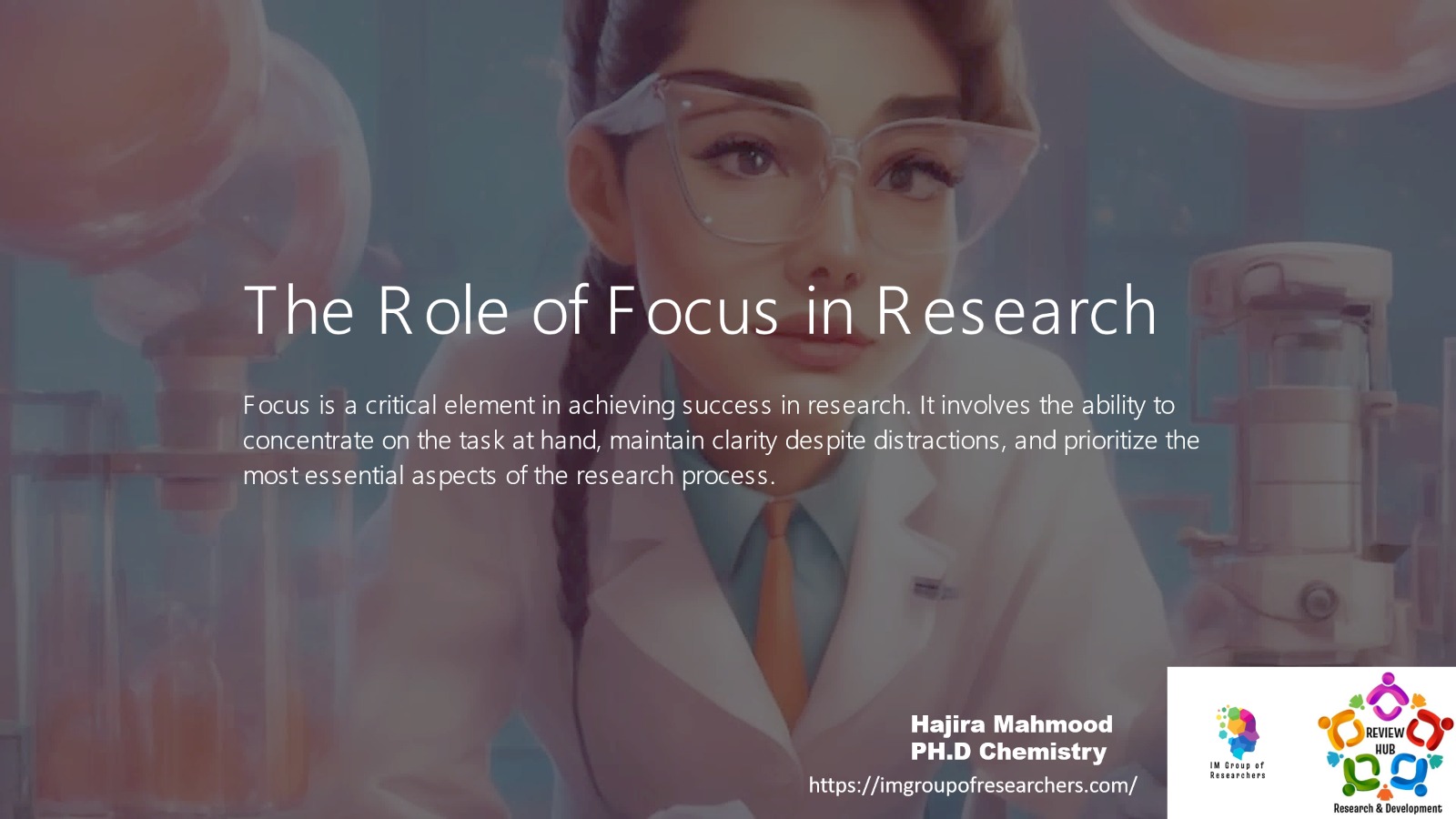Importance of Focus in Research
Focus is essential in research as it enables scholars to delve deeper into a specific topic, thereby uncovering new insights and knowledge. Maintaining consistent attention to detail allows researchers to form connections between various data points, leading to more comprehensive findings. Read further the Importance of Focus in Research.
Author: Hajira Mahmood
LinkedIn: Click here to see Hajira’s profile
Moreover, focus ensures that time and resources are utilized efficiently, preventing dilution of efforts across unrelated areas. It leads to a more purposeful pursuit of answers and innovation within the research field.
↪ Concentration
Developing the ability to concentrate for prolonged periods enables researchers to engage deeply with their subject matter, leading to nuanced understanding and critical analysis.
↪ Identification
Focusing on specific research objectives allows scholars to identify gaps in the existing body of knowledge, which can contribute to breakthroughs and advancements in the field.
↪ Efficiency
Effective focus enhances the efficiency of the research process, resulting in a streamlined approach toward achieving research goals.
▶ Benefits of Maintaining Focus
Maintaining focus in research not only enhances the quality of outcomes but also has numerous other benefits. It facilitates a deeper understanding of the research topic, leading to valuable insights and breakthroughs. Focus also contributes to greater productivity, as scholars are able to accomplish more in less time.
↪ Innovative Solutions
By concentrating efforts on specific aspects of research, scholars can develop innovative solutions that address complex problems within their respective fields.
↪ Enhanced Creativity
Focus fosters creativity by allowing researchers to explore ideas in-depth and make unique connections between various concepts, leading to original discoveries and perspectives.
↪ Quality Research Outputs
Focusing on key research areas leads to high-quality outputs, such as publications, patents, and contributions to the academic and scientific community.
▶ Strategies for Improving Focus in Research
Improving focus in research involves adopting specific strategies and practices that aid in maintaining concentration, reducing distractions, and enhancing cognitive performance. These strategies can significantly boost the quality and efficiency of the research process.
↪ Time Management
Implementing effective time management techniques can help researchers allocate dedicated time slots for focused work, allowing for deep engagement with the research topic.
Mindfulness Practices
Engaging in mindfulness activities, such as meditation and deep breathing exercises, can improve concentration and mental clarity, leading to enhanced focus during research activities.
↪ Task Prioritization
Prioritizing research tasks based on their importance and relevance can prevent cognitive overload and enable researchers to concentrate on the most critical aspects of their work.
▶ Overcoming Distractions
Research environments often present various distractions that can hinder focus and productivity. Overcoming these distractions is crucial for maintaining a conducive work environment that promotes deep engagement with the research topic.
▶ Techniques for Staying Focused
Staying focused throughout the research process requires the use of specific techniques and habits that support cognitive concentration and sustained attention. Researchers can employ these techniques to enhance their focus and productivity.
↪ Environment Optimization
Creating an organized and quiet research environment can significantly minimize distractions and boost focus.
↪ Regular Breaks
Taking regular breaks during research activities can prevent mental fatigue and improve overall cognitive performance.
↪ Goal Setting
Setting clear and achievable research goals provides researchers with a sense of direction, aiding in sustained focus and motivation.
▶ Case Studies of Successful Research Projects
Examining case studies of successful research projects can provide valuable insights into the impact of focus on research outcomes. These real-world examples illustrate the benefits of maintaining a focused approach and the positive impact it has on the quality and significance of research findings.
| Research Project | Key Findings |
| Biomedical Research Study | The study identified novel biomarkers for early disease detection, leading to significant advancements in diagnostic tools and treatments. |
| Environmental Impact Analysis | The research project contributed to the development of sustainable environmental policies and practices, addressing key ecological challenges. |
▶ Conclusion
In conclusion, focus plays an indispensable role in the success of research endeavors. By maintaining a concentrated approach, researchers can drive meaningful progress, uncover new knowledge, and make transformative contributions to their respective fields. Implementing strategies for sustaining focus, overcoming distractions, and learning from successful case studies can further enhance the quality and impact of research outcomes.
Also read: Wound Healing
Follow Us on

